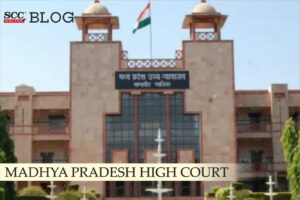Madhya Pradesh High Court: Dwarka Dhish Bansal, J., while dismissing a second appeal held that in presence of prior execution of agreement of Gift, the Will becomes a suspicious document.
The factual matrix of the case was that the land in question belonged to a deceased-Vindeshwari Prasad. It was alleged in the plaint that after the death of Vindeshwari Prasad, the plaintiffs and defendants 1-2 were having 1/3rd share each and there was no right vested in defendants 3-6. The instant suit was filed as second appeal against the judgement rendered by Additional District Judge (Fast Track Court) Rewa which had confirmed the judgment and decree passed by 5th Civil Judge Class-II Rewa.
It was submitted by the appellant that in view of the concurrent finding of the fact that the plaintiff was not in physical possession of the land, the suit filed was not maintainable in view of provision under Section 34 of the Specific Relief Act, 1963. It was further contended by the appellants that in absence of the evidence of any forged document, the suit was not maintainable. It was contended by the appellants that Will in question was not a proven document and the Trial Court had made an error.
The counsel for the respondent submitted that as the Will was not proved by the defendants 3-5 and could not been found proved by the Courts, no interference could be warranted in the second appeal. It was further contended by the respondents that Will in question was propounded by the defendants 3-5, and therefore they were liable. It was also contended by the respondents that the property in question was an agriculture /revenue paying land and partition had to be effected by the Tehsildar.
The first substantial question of law was whether the declaration of share could be made irrespective of Section 34 of Specific Relief Act, 1963. The High Court came to the conclusion that the declaration of share could be made irrespective of Section 34 of the Specific Relief Act, especially in case where the land was agriculture land. The Court relied on the judgement of Karelal v. Gyanbai, 2018 SCC OnLine MP 1021 where there were identical set of facts and circumstances, and the Court had held that- “The matter can be ascertained from another angle also. In the present case, only the agricultural land is the disputed property. If the defendants had never challenged the rights and title of the plaintiffs, then there was no need for the plaintiffs to file a suit for declaration of title or even for partition.”
The second substantial question of law was that the Will was propounded by defendants 3-5, therefore it was for them to prove Will in question which was not proved by the Courts below. The Court relied on the judgment of Anathula Sudhakar v. P. Bucchi Reddy, (2008) 4 SCC 594 where it was held that “a cloud is said to raise over the person’s title, when some apparent defect in his title to a property, or when some prima facie right of a third party over, is made or shown.” The Court pointed out that the principle enshrined in order 6 rule 13 Civil Procedure Code, 1908 is also worth importance wherein it was specifically laid down that the burden of proving the will always lies upon the propounder, i.e. defendant in the present case. The Court also considered the proposition laid down by Supreme Court in Anathula Sudhakar after which it became apparent that a relief of declaration is required to be sought only when the defendant is able to show any apparent defect in title of plaintiff. It was observed by the Court that the findings with regard to the execution of the will was purely a question of fact and therefore cannot be interfered with by this Court as it was laid down in Sham lal v. Sanjeev Kumar, (2009) 12 SCC 454. The Court held that in presence of prior execution of Agreement of Gift, the Will becomes a suspicious document.
The High Court dismissed the second appeal.
[Ramkali v. Murirtkumari, Second Appeal No.1015 of 2004, decided on 20-07-2022]
Advocates who appeared in this case :
Sankalp Kochar, Advocate, for the Petitioner;
Ashok Lalwani, Advocate, for the Respondent.

